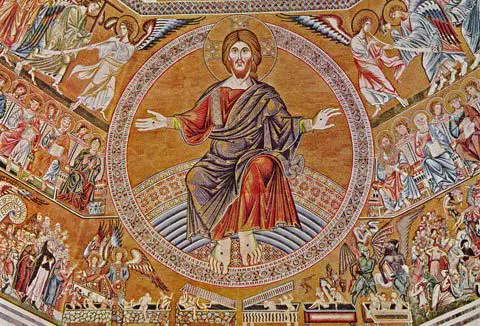Author: Protopresbyter Mihail Pomazanski
Vladimir Solovyov gave a new impetus to the development of Russian philosophical and theological thought, setting himself the task of “justifying the faith of the fathers” before the reason of his contemporaries. Unfortunately, he made a number of clear deviations from the Orthodox-Christian way of thinking, many of which were adopted and further developed by his followers.
Here is a brief exposition of these moments in Solovyov, which stand out because of their difference and even their clear deviation from the creed professed by the Church.
1) He presents Christianity as the highest stage of the overall sequential development of religions. According to Solovyov, all religions are true, but one-sided, and Christianity synthesizes the positive aspects of previous religions. He wrote: “Just as external nature is revealed to the human mind gradually, in consequence of which we must speak of the development of experience and natural science, so the divine principle is gradually revealed to the human mind, and we must speak of the development of religious experience and religious thought … Religious development is a positive and objective process, it is a real interaction between God and man – a God-human process. It is clear, wrote Solovyov, that none of the stages and none of the moments of the religious process can be in itself a lie or a delusion. “False religion” is contradictio in adjecto”*.
2) The doctrine of the salvation of the world in the form in which it was given under the apostles is cast aside. According to Soloviev, Christ came to earth not to “save the human race”, but to elevate it to a higher level in the order of the successive manifestation of the divine principle in the world – the elevation and deification of man and the world. Christ is the highest link in the series of theophanies (epiphanies), crowning the previous theophanies.
3) Solovyov’s theology focuses on the ontological side of being, that is, on the life of God Himself in Himself, and due to the insufficiency of the Holy Scriptures, thought resorts to arbitrary constructions – rational or based on imagination.
4) A being named “Sophia” is introduced into the Divine life, standing on the border between the Divinity and the created world.
5) A distinction between male and female is introduced in the Divine life. With Solovyov, this moment is obscured. Father Pavel Florensky, following Soloviev, presents Sophia as follows: “This is a great Royal, Feminine Being, who, without being either God, nor the eternal Son of God, nor an angel, nor a holy man, receives veneration both from the finisher of the Old Testament and from the Progenitor of the New” (“Pillar and affirmation of truth”).
6) An elemental beginning, an elemental aspiration, is introduced into the Divine life, forcing God the Word Himself to participate in a certain process, a beginning that subordinates the Logos to this process, which must elevate the world from the state of pure materiality and limitation to the most perfect forms of being.
7) God as the Absolute, God the Father, is presented as distant and inaccessible to the world and man. Despite what is said in the word of God, He separates himself from the world in an inaccessible area of being, which as absolute being has no contact with relative being, with the world of phenomena. Therefore, according to Solovyov, a mediator between the Absolute and the world is necessary. Such a mediator is the “Logos”, who became incarnate in Christ.
8) According to Soloviev, the first Adam united in himself the divine and the human nature, similar to their relationship in the God-manhood of the incarnate Word, only that he violated this relationship. If it is so, then the deification of man is not only a gracious sanctification of man, but is a restoration in him of the divine humanity, a restoration of the two natures. But this does not agree with the entire teaching of the Church, which understands deification only as beneficence. “There has not been and there will not be another person, says Rev. John Damascene, consisting of Divinity and humanity, except Jesus Christ.”
9) Solovyov writes: “God is the all-powerful Creator and All-Sustainer, but He is the Ruler of the earth and the creatures that come from it.” <…> “Deity is incommensurable with earthly creatures and can have a moral-practical relationship (power, dominance, management) towards them only through the mediation of man, who as a divine being is commensurate with both Deity and material nature. In this way, man is a necessary basis for true Divine rule” (“History and Future Theocracies”). This position is unacceptable from the point of view of the glory and power of God and so to speak contradicts the word of God. At the same time, it is disproved by the simple observation of the existing. Man subjugates nature to himself, not in the name of God as a mediator between God and the world, but for his own selfish needs and purposes.
The points noted here, where Solovyov’s views diverge from the teachings of the Church, show that Solovyov’s religious system is completely unacceptable to the Orthodox consciousness.
Note:
* contradictio in adjecto – (lat.) contradiction in definition, such as “round square”, “dry moisture”, “wooden iron”, etc.
Source: Protopresbyter Mikhail Pomazansky. Orthodox dogmatic theology. St. Herman of Alaska Brotherhood Press, 1992.







